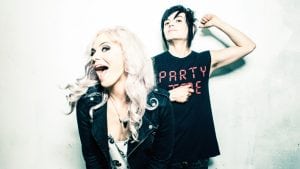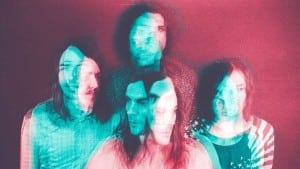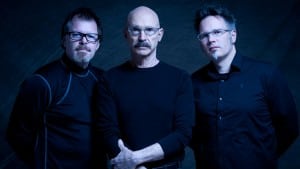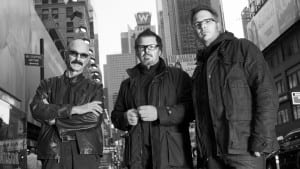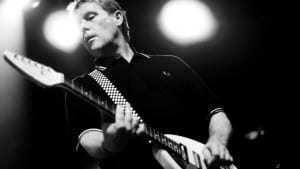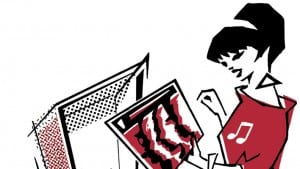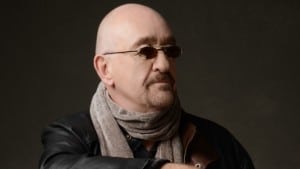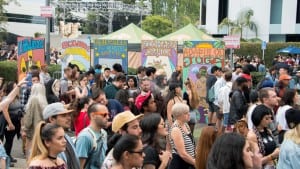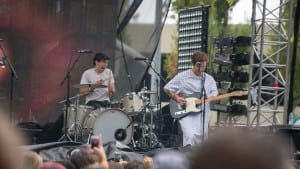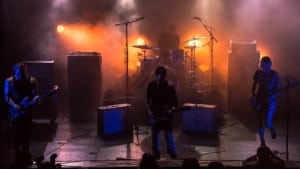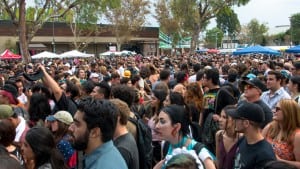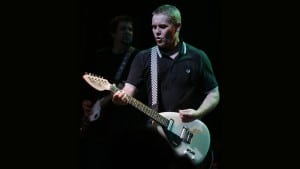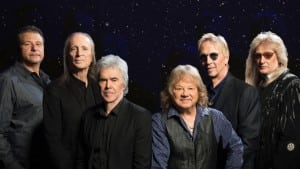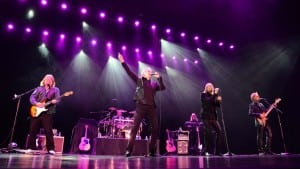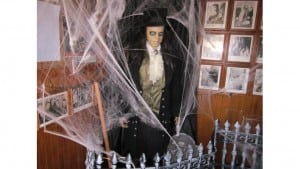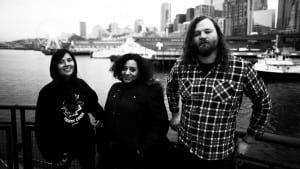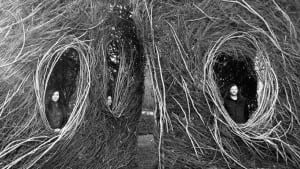Pop-punk veterans The Dollyrots—forged around the partnership of spouses Kelly Ogden (lead vox and bass) and Luis Cabeza (guitar)— have been making melodic, badass, guitar-driven tunes for years. The band is self-releasing their sixth studio album, Whiplash Splash, on Mar 24, and will be bringing their electric live show to The Hi Hat in LA on Mar 31, and Slidebar in Fullerton on Apr 1.
Think you’re busy? Just ask Ogden what she’s doing on any given day. Concert Guide Live squeaked into Ogden’s insane schedule to chat about the new record, Trump, and how she balances life on the road with the most rock-n-roll thing of all—raising a family.
CONCERT GUIDE LIVE: What’s on the agenda for today?
KELLY OGDEN: Oh my God, we showed a house that we are property managing, ate Taco Bell, went to Staples to buy postage for the pledge, and got back here just in time. I had to cancel a writing session with Jaret [Reddick] from Bowling For Soup—we’re gonna do a duets album together—and I totally forgot that I have three other things to do this afternoon [laughs]. As soon as I’m done here, I’m gonna go stuff CD’s in envelopes and then we have a Skype interview, we’ll eat somewhere in the middle…maybe.
CGL: You guys are getting ready to head out on tour. How do you handle touring with the kids?
KO: It starts out really hard at the airport, because we have two guitars, two children, two car seats, a whole bunch of merch, and then suitcases. In so many ways, being on tour is actually easier.
I feel like the hardest part of parenting little kids is when they get bored. When they get bored, they misbehave, and when we’re out on tour River [Ogden and Cabeza’s oldest] doesn’t really have a chance to be bored.
Luckily, Daisy [their new daughter that Ogden was pregnant with while recording Whiplash Splash] is a pretty chill baby. Once she’s also walking, I think we’ll have to take a little time off touring, because I don’t think we can do two running toddlers [laughs]. We’ll do it, because we’re crazy.
CGL: That’s such a cool experience for them!
KO: Whenever we get near the airport, River’s like, ‘Are we going on tour?!’ It’s something he really looks forward to, and we have an awesome crew that helps us with merch, and driving, and baby wrangling, and they’re kind of like his aunts and uncles. We’re really, really lucky. I kind of can’t believe this is our reality right now. It’s so cool.
CGL: What makes Whiplash Splash different from your other albums?
KO: I think that it’s more spontaneous, because we didn’t have time to overthink anything. The whole thing was written in less than a month. Luis would record an instrumental overnight, and then I would wake up the next day and go in and record vocals, so we did a lot of things separately. I think it’s more mature, but still a lot of fun. It’s a little bit less 8th grade poetry, but we’re still really good at 8th grade poetry [laughs], that’s still there.
CGL: What’s your favorite thing about going the fan-funded route?
KO: We have a real relationship with our fans now. They know how it works, we know what’s expected of us, which is an awesome album that they like—or we hope they like it because they already bought it—so we can’t disappoint them. It makes us a better band, it makes us more efficient, we have to stick to the deadlines that we give them, and it gives us tons of freedom as artists because the only approval we need is our own. We’re not asking a label, we’re completely DIY at this point. Everything is between us and the fans, which makes a more pure product.
CGL: That must be gratifying that they keep showing up.
KO: This’ll be the fourth album that we’ve put out this way. Each time it has gotten bigger. We make sure we do lots of silly, behind the scenes footage and bonus content. It suits our lifestyle, and it means that we can keep making music, and we can have a family, and we can tour, and we can meet all these people who believe in our band.
CGL: You guys recorded two albums on Joan Jett’s Blackheart Records. What’s she like?
KO: She is absolutely one of the coolest people I’ve ever known. We were on Warped Tour with Joan Jett and I gave her what would become “Because I’m Awesome” and they gave us a call about a month after the tour like, ‘We listened to the CD and we love it! You want to be on our label?’
We didn’t expect to even get to know Joan—we figured she was kind of a figurehead—but through the years we would go to her shows, and watch her perform, and see her team working behind the scenes, and we learned the things that were important to her like animal rights, LGBTQ rights, and it really helped form our opinions about the best way to utilize the band. We would joke, ‘What would Joan Jett’ do all the time in the early days.
CGL: You guys decided to do the band full time back in 2000 when Bush won the election. I can’t imagine how you’re feeling now that Trump is in the White House.
KO: It’s so bad, it’s almost funny. I still don’t quite know what to do, except march, and make phone calls, and send postcards, and be much more politically aware than I was before. I think that’s more on a personal level, than on a band level. A political song will end up on each album, but it’s not blatantly a political song, like “S.O.S,” or “Starting Over Again.” We do put our two cents out there. But it’s a shit show. I can’t believe it.
CGL: All these years of being a female-fronted rock band I’m sure you’ve experienced your fair share of sexism.
KO: Luckily the kind of music that we play—it’s rock and roll, it’s pop-punk—those scenes have always included women. Joan Jett would always say, ‘You just do you, and be best that you can be. Prove people wrong.’
I want to be someone that younger girls can look to. Now I’m a mom, and I’m still in a band, and you can sort of do it all. You need a lot of help [laughs] but it’s definitely a beautiful thing if you can make it happen.
CGL: I feel like in the past, and maybe even now women in rock are expected to be a certain way: single, hard-asses, with no kids, that stay out late, party hard. I love that you are so open about being a mother and are constantly posting about your kids, and breastfeeding. Are those conscious decisions you’ve made?
KO: When you become a mother, it’s all-encompassing. But sometimes I’m thinking, ‘Well, maybe we won’t post any pictures of the kids on social media.’ But that’s impossible [laughs]! The type of band we are, and our relationship with our fans, they really want to see the happy family that we have, and are so lucky to have. We’ve been together since we were kids!
I just feel like we’ve been so fortunate to have the life that we have, and there aren’t a whole lot of great examples, so it’s kind of our place to be that. It isn’t the easiest thing either. Kim Gordon did it, but I can’t really call her and be like, ‘What do I do about this situation,’ and that didn’t really have a happy ending anyways, so…[laughs].
CGL: What’s your advice for up and coming female rock musicians?
KO: Getting out on tour is probably the most important thing you can do. You will become more confident in your performance, you’ll become more confident in your person.
I think it’s so easy for people to just make music, and record it, and post it online, and wait to see if people like it. I think that without all those years of us just being in a band, in a van, driving back and forth across the United States for months at a time, without that there’s no way that any of this would be working.
